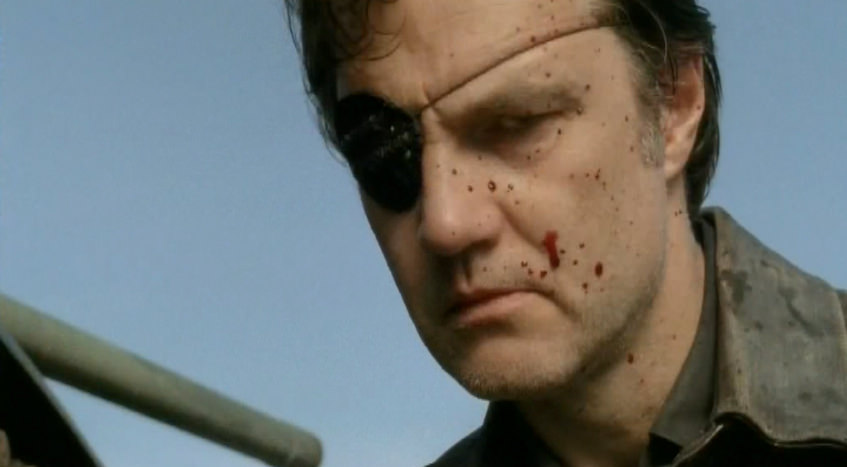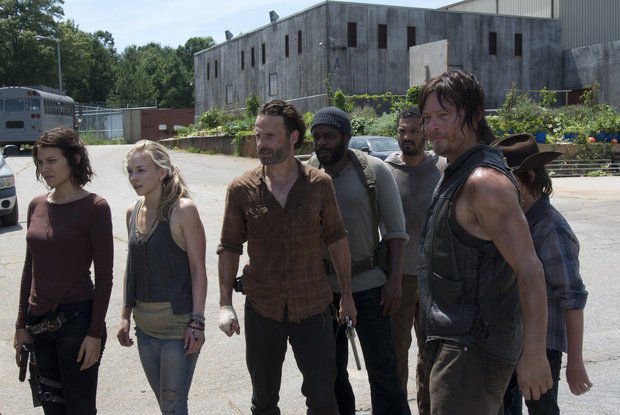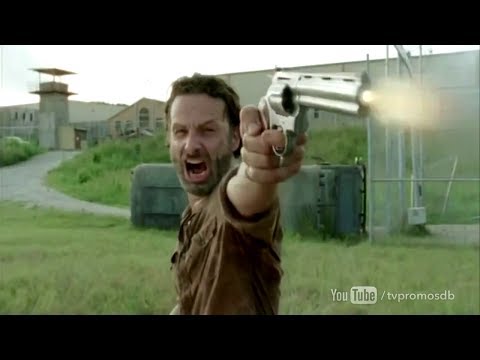Originally posted at The Nerds of Color
This is my recap for The Walking Dead season 4, episode 8 — the mid-season finale — titled “Too Far Gone”. Please also check out our live-tweeting session #NOCemdead, featuring me at @Reappropriate and J. Lamb through @TheNerdsofColor.
And, here we go! Spoilers ensue, after the jump!
Whoo, boy. I need a minute after that doozy of an episode. I’m still shocked, stunned, horrified, traumatized, and all-round devastated.
Despite last episode’s cliffhanger tease that left the Governor with his pistol drawn on an unsuspecting Michonne and Hershel, we find out in the pre-opening scene that the Governor did not in fact gun Michonne down in the streets. Such an act might have suited the Governor who tossed Martinez into a Walker pit or stabbed Petey in the back, but was just too simple for the fully-evolved Governor 2.0. Instead, the Governor bum-rushes and pistol whips Michonne and kidnaps both her and Hershel. We then find the Governor convincing his new army that they must take the Prison in order to remain safe.
And so is introduced one of the several major vanities of tonight’s episode.
Don’t get me twisted; I liked “Too Far Gone”. Moments after the credits rolled, I tweeted that this episode “rocked”. But, upon thinking a little more about the episode, I realized that it rocked despite several critical plot holes, but ones that were conveniently painted over in a wash of chaotic violence and major character death.

The first major plot hole is how quickly the Governor’s new army buy his motivational speech. Initially introduced as a relatively unassuming, generally peaceable community (who wouldn’t challenge Martinez’s “this is the party survival group” philosophy), they swallow the Governor’s call-to-arms hook, line and sinker. The Governor need only tell his followers that the Prison is populated by hostile, sociopathic killers and immediately his army is swayed to commit mass murder to take the Prison. The Governor says that the Prison can be taken with a minimum of bloodshed, that they need only bluff their way in. Nearly none of them openly protest; none point out the obvious flaws in the argument suggesting a small group armed with a few guns can or should take out a fortified encampment defended by ruthless killers, or note that these complete strangers don’t deserve expulsion or death.
The only one to question the Governor at all is Fake Andrea, who points out that there must be plenty of safer places than the middle of the woods that can be defended. But, again, her protests are generally whiny and lacklustre, and mostly just earn her “camp defense” duty while everyone else confronts Rick at the Prison. With the tank.
Okay, so — perhaps the initial call-to-arms is convincing enough to get the Governor’s followers to show up at the Prison armed to teeth. I could buy this; after all, the Governor tends to surround himself with sheeple, and then keeps them in line with intricate webs of lies. But, the vast majority of the episode is spent in a tense parley at the gates between the Governor and Rick.
The Governor, his followers, and tank-driving Mitch, show up at the Prison’s outer fence just as Rick tells Daryl of Carol’s departure and both are about to let Tyreese know (but Tyreese is distracted by a vivisected rat). The Governor — wielding Michonne’s samurai sword– brings Hershel and Michonne out, and demands that Rick and his posse abandon the Prison or he will kill his hostages. Rick pleads with the Governor to let Michonne and Hershel go, saying “you have a tank, you don’t need hostages”. He suggests that the Governor’s group can join them in the Prison, living in another cellblock and neither need bother the other. He argues that taking down the fences will compromise the Prison for everyone.
Now, this is a compelling evolution for Rick’s character. Rage-oholic Rick, who just a few seasons earlier was willing to scorch the Earth to protect his community, is willing to compromise for peace. This is the Rick who recognizes that he is not the leader of the Prison, and resists making unilateral decisions for the group. He rejects his own bloodlust. In other words, he is — and sounds — eminently reasonable.
This was the point where the episode broke, plot-wise. While Rick is pleading for sanity, we can’t help but wonder why the Governor’s army isn’t quietly mutinying behind him. This is exactly the opposite of what the Governor insisted Rick was — not the ruthless murderer, the heartless survivor, the tyrannical ruler. Instead, it is Rick negotiating peace, while the Governor wields the sword and threatens violence. Given the theme of the Governor’s motivational speech delivered just a few minutes earlier, it’s hard to imagine how the Governor’s army can continue to saber-rattle with his lies so obviously exposed.
And, when the Governor rejects Rick’s offer with a single swing of Michonne’s blade, partially decapitating Hershel in a heart-rending scene, why do his followers — initially skeptical of the need to even take on the Prison — so quickly open fire and charge the Prison fences? By this point it is clear that the ruthless killer is the Governor, yet his army is largely unconcerned by this fact. Only Fake Maggie refuses to fight, and her conflict of conscience is mistaken by girlfriend Alicia as fear.
This unconvincing behaviour is a product of, again, the problematic pacing of the Governor’s origin story which introduced this new band of fighters in the first place. The first half of the two-part story arc failed to make the Governor’s new Fake family appealing, so it’s hard to be emotionally invested in them when they are in danger. The second half didn’t sufficiently humanize any of the Governor’s new cast of fighters who actually then survive the episode — except crazy Mitch. This results in the Governor taking on the Prison with an army of unthinking redshirts, a sad vanity that could have been easily rectified with better writing.
In contrast, consider how well done the characterization of the Prison community is done over the course of this season and in this episode.

The moment of pure anguish when Maggie and Beth witness the killing of their father mirrors our own devastation at the loss of a character that a single episode helped us fall in love with. The Governor’s redshirts are mowed down in a series of action scenes — goodbye Mitch, au revoir Alicia — but none of their deaths resonates compared to Hershel’s. Nor should they, to be fair, but I wish the writers had been able to pit two armies containing characters we cared about against one another: that way we would not only feel the moral ambiguity of the confrontation more deeply, but we would also more greatly mourn the price of the conflict. Instead, we were given a fairly straightforward black-and-white morality tale, with the Rick the indisputable White Hat, and the Governor looking dapper in Black.
After decapitating Hershel in ruthless and unnecessary bloodlust (the second vanity is why the Governor takes the time to saw Hershel’s head off, even after acknowledging that he respects Hershel?), Rick and the Governor fight . Mitch drives the tank into the fences, and pins Daryl down only to have Daryl use a Walker flesh-shield to throw a grenade into the tank and then drive a crossbow bolt into Mitch’s heart. Maggie pulls Glenn from the cells — he is still recovering from Megaflu and too weak to fight — and puts him on a bus, which drives away with the other non-fighters, although Maggie is left outside when she goes back to rescue Sasha and Bob Stookey (the latter who is wounded in the gunfight). Lizzy and Mika, initially charged along with the other children to protect Judith, ditch the other kids to adopt Carol’s mantra of “being strong”; they appear in the nick of time to rescue a pinned down Tyreese by shooting Alicia and another redshirt in the head.
Meanwhile, back at camp, Fake Andrea is guarding the campers when Fake Penny accidentally frees a buried Walker, which proceeds to bite her. Fake Andrea appears at the Prison battle, carrying Fake Penny’s corpse in her arms. The Governor coldly shoots Penny in the head, a stark contrast to his treatment of the real Penny after she turned.
Rick and the Governor charge one another, and the Governor nearly succeeds in throttling Rick when Michonne stabs him in the heart with her sword. She leaves him to turn, and Rick runs back to the Prison and reunites with (badass, shotgun-wielding) Carl. Both discover Judith’s empty carseat, and suffer another emotional breakdown at the apparent death of the survivors’ youngest member.
The episode ends with the Prison fallen, the fences shattered beyond repair and the cellblocks overrun by Walkers attracted by the gunfire, and the Prison community scattered: Daryl is with Beth; Glenn is on the schoolbus; Maggie is with Stookey and Sasha; Tyreese is with Lizzy and Mika; Rick is with Carl and presumably will meet back up with Michonne.
The final vanity of the episode: the Governor is dying in the mud when Fake Andrea walks up and shoots him in the head with a pistol. This isn’t portrayed as a mercy-killing; it is portrayed as cold, angry, and perhaps revenge for the Governor’s treatment of Meghan/Fake Penny. But, why? Why would squeamish Fake Andrea — who earlier in the episode indicated a reluctance towards any sort of violence — do this? There are plenty of explanations, but none that are inherent to the episode, leaving Fake Andrea’s actions unexplained and kind of weirdly out-of-character.
Nonetheless, all these plot holes aside, season 4’s mid-season finale was a capable return to form for the series, after its muddled Governor back-story tangent. It was compelling, action-driven, and edge-of-your-seat Walking Dead, and generally a pleasure to watch.
If I have one final complaint about the episode, it is the decision to kill Hershel. In retrospect, the hints were there that Hershel wasn’t going to make it past the first half of this season. The laws of The Walking Dead have established that any character who receives a spotlight episode (and who isn’t Rick or Daryl) is doomed to leave, and certainly the incredible Hershel-centric fifth episode of this season felt like a farewell. But, with Hershel’s gruesome exit, I worry that the power dynamics of the show are off. Hershel played a critical part of the survivor group, serving as the community’s moral center and a foil for Rick. Now that he is gone, who will balance Rick’s rage with wisdom? Will Rick inherit Hershel’s peaceful equivocation, and will Carl be imbued with Rick’s anger?
Other questions remain at the end of last night’s mid-season finale: How will the survivors reunite? Will any of them meet Fake Andrea and Fake Maggie on the road and forgive them? Will Tyreese — not aware of her crimes — find Carol and ignite the romance that the two characters share in the comic? Is Judith dead?
And, for everyone who found the Prison setting stagnant, was the human price of getting them back on the road worth it?
Only time — or more specifically, the February return of The Walking Dead — holds the answers to these and other questions. Thanks to everyone who has been following my season 4 recaps of The Walking Dead and who participated in our epic fun live-tweet sessions: we’ll catch you after the break!

